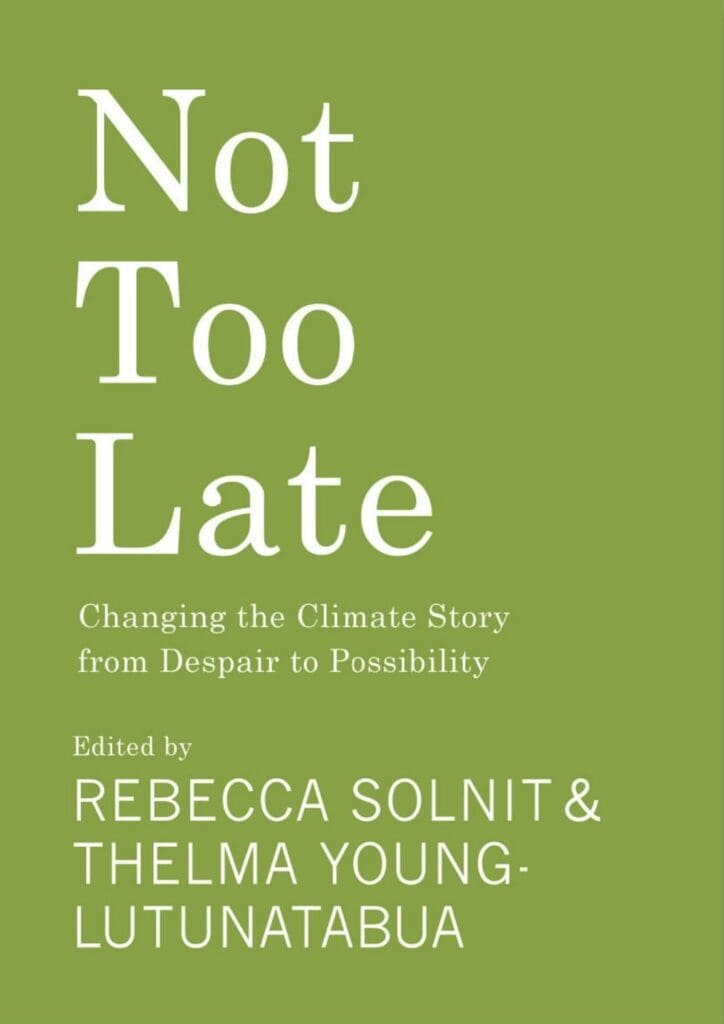The sun has not yet set on climate activism and our potential for a bright future. So say Rebecca Solnit and Thelma Young Lutunatabua, the editors of a new collection of essays and interviews, Not Too Late: Changing the Climate Story From Despair to Possibility (200 pages; Haymarket Books). Not Too Late features the voices of advocates who have been through the mill in the fight against climate change; they show us that giving up is not an option. They have become thick-skinned and resilient, and their writing offers a guide for us to turn to when we need revitalization.
Solnit and Young Lutunatabua include works from writers, activists, and policymakers, among them adrienne maree brown, Jade Begay, Yotam Marom, Joseph Zane Sikulu, Farhana Sultana, and Edward Carr. The editors’ own essays are stirring calls to action. As Solnit writes:
It is late. We are deep in an emergency. But it is not too late, because the emergency is not over. The outcome is not decided. We are deciding it now.
The twenty international contributors to Not Too Late expand on these words. They present an energizing and diverse array of essays that use varied approaches to talk about hope, including, but not limited to, lists of political successes in the climate movement and reflections on how fear and grief are essential to processing our changing world.
Many of the essays challenge us to embrace change as inevitable, reporting on the irreversible changes that have already occurred and advising us on what needs to change on an emotional, social, and political level to ensure a future for our species. They acknowledge that confronting climate change can be overwhelming but stress the importance of processing negative emotions. As Young Lutunatabua writes, “To care about the climate crisis is to be in a steady state of managing grief and pain.”
Joëlle Gergis, an Australian climate scientist who served on the United Nations Intergovernmental Panel on Climate Change’s Sixth Assessment Report, offers a reflection on what can still be done. In her essay, “A Climate Scientist’s Take on Hope,” she writes:
When you realize that the 2020s will be remembered as the decade that determined the fate of humanity, you will tap into an eternal evolutionary force that has transformed the world time and time again.
Such transformation is paleoecologist Jacquelyn Gill’s specialty. In “The Asteroid and the Fern,” she shows us, through facts on bouts of extreme weather, that resilience is ancient. She writes that people like herself, who understand the planet’s history through its fossil record, can see that “the Earth has left a road map for how to survive the climate crisis.” Humans, she suggests, have much to learn from the trilobite, which has survived for over two hundred million years. She writes:
In the aftermath of every catastrophe, the survivors radiate into a diversity of forms and strategies, weaving new patterns in the tapestry of life.
Every invigorating piece in Not Too Late shows us what life on our planet is capable of, reminding us of all we have accomplished thus far. They spur a sense of deep responsibility and a need for action. The essays and interviews are approachable for those less versed in scientific terminology, and, ultimately, the power of the collection channels that of Mary Anne Hitt’s “Love Letter From the Clean Energy Future,” in which she writes, “I can’t wait to see what we’ll do next.”

